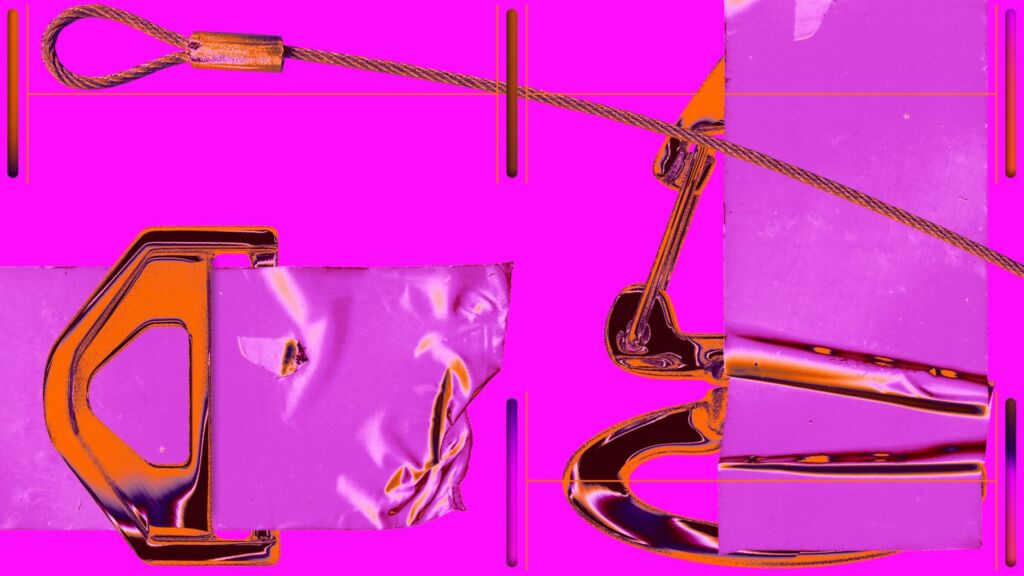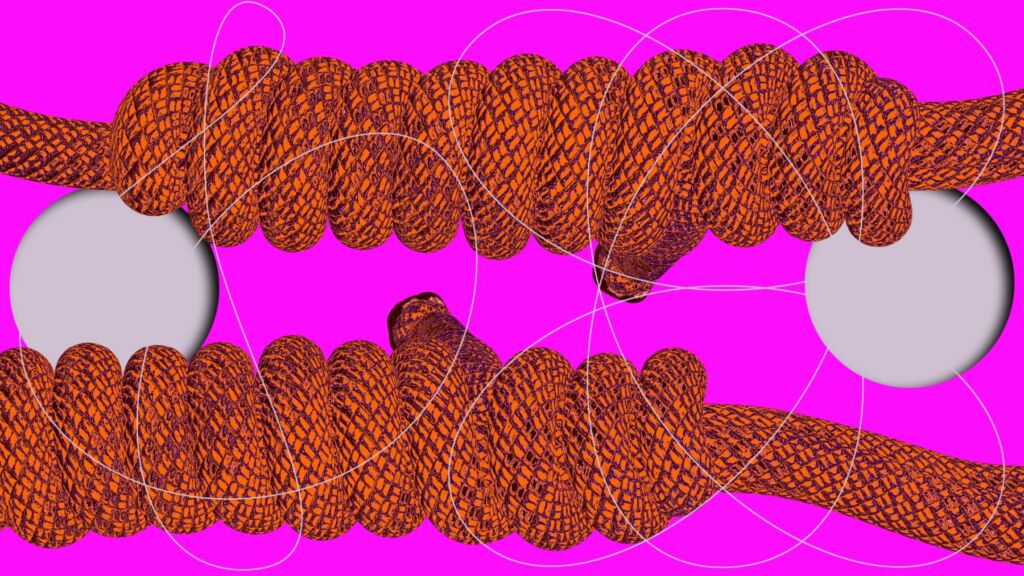Text by CLOT Magazine

Rewire, the annual international festival for adventurous music, is returning to Den Haag, Netherlands, with its 12th edition, bringing together a wide range of musical and interdisciplinary performances, specially commissioned works, club nights, installations, talks, and screenings. From 6 to 9 April 2023, Rewire will present forward-thinking and genre-bending music across various venues.
The final art and discourse programme has just been announced and, similarly to other years, consists of an exhibition, extensive talks, film screenings, and workshops.
Rewire and iii collaborate again to bring Proximity Music: Visceral Acts. This is the 3rd year that the festival and the artist-run community platform (that supports new interdisciplinary practices linking performance, technology and the human senses) contribute to the exhibition programme. The programme seeks to connect music, architecture, technology, ritual, and play through physical experiences engaging with all the senses.
In their curatorial statement, curator Matteo Marangoni states: Proximity Music: Visceral Acts is an exhibition inviting us to engage playfully with mind and body. Presenting a diverse range of works emerging from the backdrop of a health crisis, it brings into question ideas of health and sanity. Through the lens of personal, creative, if not unorthodox approaches, artists help us trace paths backwards and forwards in time, connecting with different forms of knowledge.
In Proximity Music: Visceral Acts, the exhibiting artists will present works that play with materials, technologies and rituals associated with health and healing. While advancements in the medical world have made it possible to cure better than ever, its treatments have become increasingly scary. The exhibition aims to reflect on our relationship to health and the power of art, music and ritual to transform our consciousness.
Marangoni shares that this health issue has been in the back of his mind since things opened up after two years of intermittent lockdowns, and he noticed how much artistic output had turned to health-related subjects. At the same time, in the Dutch cultural sector, he was witnessing a high level of exhaustion, which also affected iii and himself personally, with physical and mental health a preoccupation, very much still present.
Therefore, I was interested in the different perspectives that artists could bring to this subject. Moreover, compared to the functional information we can receive from the healthcare or government sector, I felt the need to connect to more personal, intimate and aesthetic perspectives.
The exhibition will also address the loss of ancient knowledge and practices, connecting modern medical techniques with traditional rituals in completely imaginary new scenarios. This is something becoming more frequent in art currents. New forms of ritualistic practices, spirituality and healing are being reexamined by a new wave of artists, which incorporate technological advances to bring those practices into post-contemporary narratives.
In that respect, Marangoni also tells us that what is interesting indeed is how we create stories that have the power to give meaning to experience: Our experience is so different from that of our ancestors, so our stories need to be revised. And this renewal is not sufficient only in the domain that we might refer to as “content”, such as the words for a song or the notes of a tune, but also in the medium or method of delivery itself, which is what the playful interdisciplinary approach of this exhibition tries to do.
Similarly to last year, the performances, installations, dance, theatrical works and film will take place in and around the main festival venue Amare, the recently opened (2021) new performing arts centre in Den Haag.
Exhibiting artists include Aernoudt Jacobs, Alexis Bellavance, Amos Peled, Diane Mahín, Dominik ‘t Jolle & Maria Komarova, Frederique Pisuisse, Jeroen Alexander Meijer, Karel van Laere, Matteo Marangoni & Dieter Vandoren, Naama Tsabar, Naomi Rincón Gallardo, Vica Pacheco, Vivian Caccuri & Thiago Lanis. Furthermore, from 12 March onwards, three of these artists (Vivian Caccuri & Thiago Lanis, Vica Pacheco and Naomi Rincón Gallardo) are undertaking residencies at the iii workspaces, and the results will be shown during the festival.
Marangoni points out that autonomous artists’ privilege, which is perhaps why this notion needs to be defended and preserved in the first place, is to be able to do things not allowed in other professions.
To take some examples from this exhibition, he mentions how Karel van Laere and Amos Peled learned from medical professionals how to use highly advanced medical tools, to use those tools then to create audio-visual musical and theatrical performances. Vica Pacheco meanwhile takes inspiration from myths and traditional artefacts from Central America to create a digitally designed, mechanical sculpture which makes music out of the movement of water. Amos Peled will present hacked ultrasonic medical devices and their diagnostic sounds and images for performance and installation.
Human cultures have produced an enormous variety of ways to make music, each based on its own materials and techniques. It’s essential that as our material and technical culture evolves, we continue to value and support a wide diversity of ways of making music, also by encouraging technical and material experimentation.
Proximity Music: Sensing After Thought, Rewire 2022

The Rewire 2023 discourse/context programme will revolve around the theme of Inter/relations, taking place at Amare, The Grey Space in The Middle, Nieuwe Kerk, and Page Not Found. Contextualized around the festival’s music and performance line-up, the programme envisages providing a space for reflection and bringing the various practices of artists into conversation with one another. Through conversations, listening sessions and assemblies, the programme will tune into entangled environments and sound technologies while challenging existing borders and linear notions of time.
The first part of the context programme Instrumental Ecologies focuses on the ever-shifting role of technology in music and sound practice, and how artists and musicians research and experiment with the ways in which instruments and technologies are entangled with natural ecologies. It also asks how older, analogue or low-tech tools and instruments are revisited and used in experimental music. The second part will look into the interrelations between Times and Territories, challenging existing borders and linear notions of time.
The discourse programme includes contributions by Brandon LaBelle, Budhaditya Chattopadhyay, Carla J. Maier, Ellen Fullman, Giada Dalla Bontà, Hatis Noit, Hannes Liechti, Heloisa Amaral, Hildegard Westerkamp (audio contribution), Joe Rainey, Liew Niyomkarn, Lucy Liyou, Maria Chávez, Mariam Rezaei, Mark Peter Wright, Matthew Biederman, meLê yamomo, Naomi Rincón Gallardo, Nwando Ebizie, Pak Yan Lau, Pamela Z, Paul Purgas, Pierce Warnecke, Patti Smith and Soundwalk Collective, Stas Sharifullin, Vica Pacheco, Victoria Shen, Vivian Caccuri and few other yet to be announced.
Lastly, with their reflection partner Norient, Rewire will also launch the online publication All in It Together in response to the context programme’s Inter/relations theme, with essays, audio pieces and works of sonic fiction by authors from the Norient and Rewire network. How do artists relate to each other and their environments, and how does it affect their music? In which way can new forms of listening lead to new perspectives? And how to think with rather than about music?
Check the lineup and timetables here.






